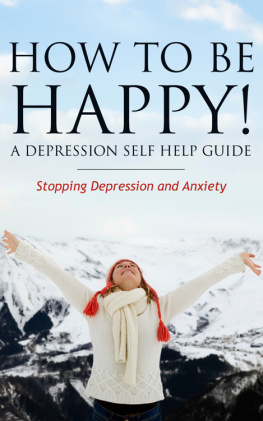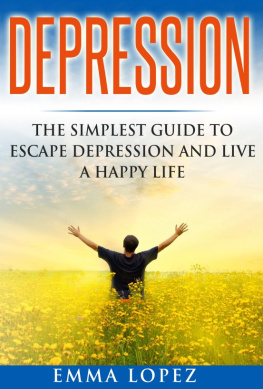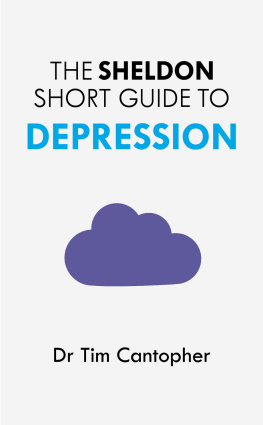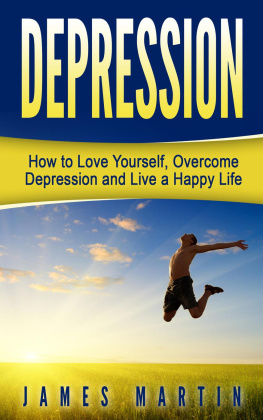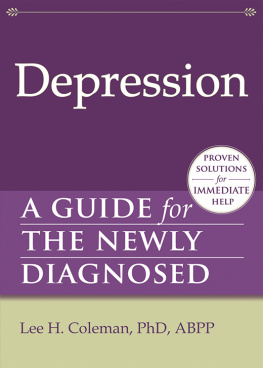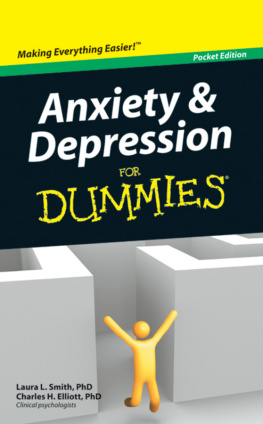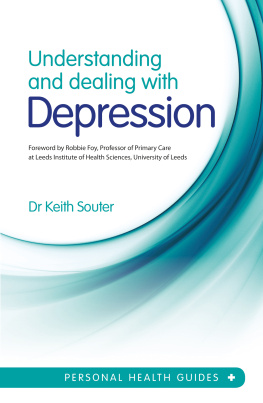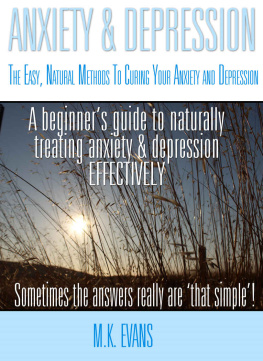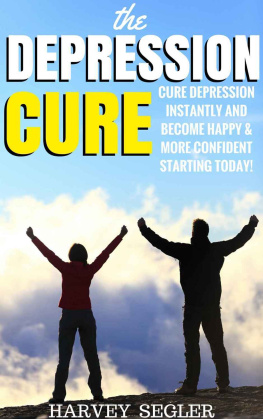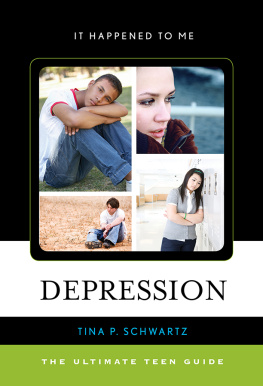How to Be Happy! A Depression Self Help Guide
Stopping Depression and Anxiety
By: Grace Anderson
Table of Contents
Publishers Notes
Disclaimer
This publication is intended to provide helpful and informative material. It is not intended to diagnose, treat, cure, or prevent any health problem or condition, nor is intended to replace the advice of a physician. No action should be taken solely on the contents of this book. Always consult your physician or qualified health-care professional on any matters regarding your health and before adopting any suggestions in this book or drawing inferences from it.
The author and publisher specifically disclaim all responsibility for any liability, loss or risk, personal or otherwise, which is incurred as a consequence, directly or indirectly, from the use or application of any contents of this book.
Any and all product names referenced within this book are the trademarks of their respective owners. None of these owners have sponsored, authorized, endorsed, or approved this book.
Always read all information provided by the manufacturers product labels before using their products. The author and publisher are not responsible for claims made by manufacturers.
Printed in the United States of America
First Printing 2013
D edication
This book is dedicated to my strongest source of support, my husband.
Chapter 1- The Happy Gene - Can You Be Happy Without One?
Happiness is a state that many people seek throughout their lives. Some research indicates that happy people are that way due to a genetic disposition that allows them to stay upbeat, even in difficult circumstances. Do you need this gene to be happy in life, or can you recreate that mental state by certain actions and thought patterns.
The Happy Gene
Scientists at the University of California in Los Angeles have determined that a specific gene controls the feeling of happiness. These happy people seem to have an easier time in life, eating well, sleeping comfortably, staying fit and going about their daily lives without the self-doubt and brooding feelings that many others have. This difference appears to be because of an oxytocin receptor gene (OXTR). Those people who have this gene have the neurochemical ability to absorb oxytocin, a chemical associated with love, attachment and other positive feelings. Happy people live longer and contract fewer stress-related diseases.
Those without the Gene
Those people who have variants of this oxytocin receptor gene tend to experience more negative thoughts and feelings because their brains cells cannot easily uptake sufficient oxytocin to overcome the fear and anxiety chemicals produced by the brain. These people may experience life with more emphasis on the negative side, like a glass half empty, rather than those with the gene who experience life as a glass half full. Some people may have a significant problem or absorbing positive brain chemicals. These people may exhibit symptoms of mild to severe depression. Professional treatment, often with prescription medication, is required to return these people to a more balanced mental state.

Making Up For a Missing Happy Gene
If you arent lucky enough to be born with the right oxytocin receptor gene, it doesnt mean you have to go through life blue and without confidence. Those without the gene may have to provide a little more conscious effort to finding the brighter side of their lives. Knowing that the problem is a lack of positive brain chemical is the first step in being able to apply a suitable solution to the problem. Scientists have also found that those suffering from this lack of brain chemical can actively work to turn the condition around.
Creating Happiness in Daily Life
The best way to take an active role in creating a sense of happiness in your life is to make a list of things provoke that intense feeling of happiness. For some people, it may be a short session of working in the garden. For others, it may be spending time chatting with friends over a beer. Others may prefer to attend church service for spiritual reflection. Still other people may prefer engaging in charitable work. Take the time to observe which situations in life give you that deep sense of happiness and peace and write it down on your list. Later, in times of negative thoughts, you can reach for the list and engage in one of the activities that help you to restore a positive frame of mind.
Though everyone may not be born with the happy gene, they can foster activities in their daily lives to increase the amount of brain chemical associated with those happy feelings. This habit creates better health and a better ability to deal with daily stress.
Chapter 2- How to Find True and Lasting Happiness
Most people believe that the state of happiness is a luxury, and not a necessity. The first step to finding true and lasting happiness is to stop thinking in this way. Happiness is a necessity for a successful life - now and in the future, and it is also a necessity for good physical and mental health. Most people also believe that happiness comes from something outside of themselves, as opposed to something inside of themselves, and this is the second thought that you must change if you want to be happy.
Start by making room for happiness in your life by taking a good, hard look at anything that is bringing unhappiness or negativity into your life. Do you hate your job? Why? Can you make changes in your current job to increase your happiness with that job? What about your personal relationships? Is there someone in your life that is constantly bringing you down? It isn't always easy to make big changes, but if you want to find happiness, you may have to make those changes. You cannot change other people, but you can change circumstances and situations in most cases, and this may mean leaving a job or a relationship behind and moving on.
Before you make big changes in your life, however, you need to understand that happiness does not come from objects, situations, or other people. The happy feeling that comes from owning nice things or having something great happen to you are always fleeting. It doesn't take long to forget to be happy about these types of things, and then you are back in a state where you are okay, without being truly happy.

Once you've cleared away things that truly make you unhappy as best as you can, you have to decide to be happy. Some people say that they want to be happy, without really meaning it. These people are at their happiest when they are surrounded by drama. There are also people in the world who do not really know what being happy means and what it means for one person may not be the same as it is for another person. For example, one person may believe that happiness is being surrounded by loved ones, while another may believe that happiness is knowing that your bills are paid, your job is secure, and you are healthy. Take the time to determine what your true definition of happiness is, with the understanding that your definition is unique to you and your life.
Happiness is a decision that you make more than anything else. You simply decide to feel joyful and happy on the inside, regardless of what is going on around you, and before you know it, that happiness and joy is overflowing and showing on the outside as well. If you are the type of person who easily sees the worst in every situation, it will take time and mindful practice to reach the place where you are automatically happy, but it can be done. In the end, you don't have to 'find' happiness at all. It already exists inside of you. All you have to do to feel happy is to allow it to shine through and beyond everything else inside of you, and everything in your environment as well.
Next page
